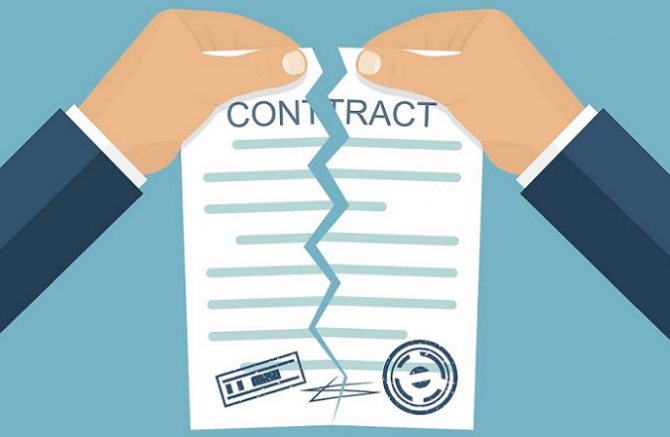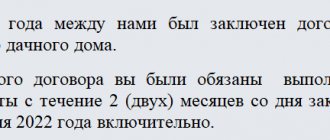In accordance with paragraph 1 of Art. 330 of the Civil Code of Russia, in case of refusal to fulfill or improper fulfillment of obligations, in the case we are considering in case of delay in execution, the violator is obliged to pay the victim a penalty, the amount of which can be established in the form of a penalty (periodic payment) or a fine.
The agreement on the penalty is drawn up in writing in accordance with the regulated requirements of clauses 2 and 3 of Art. 34 of the Civil Code of Russia, regardless of the type of main obligation for which the delay arose. In case of non-compliance with the requirement for written form, the agreement on a penalty, in accordance with Art. 168 and art. 162 of the Civil Code of the Russian Federation will not have legal force.
When does the right to demand payment of a penalty arise?
A consumer may demand payment of a penalty if both of the following factors occur:
- The violator, for example, the seller of the goods or the provider of the service, has violated the obligations under the contract (can be concluded orally or in writing);
- By law or agreement of the parties, the injured party to the contract is given the right to receive a penalty.
Any penalty has a stimulating and compensatory nature at the same time. Knowing about the possibility of collection, the obligated participant in the transaction strives to fulfill its obligations on time and efficiently. At the same time, the consumer can expect that if a delay occurs, the negative consequences of poor performance of obligations will be compensated by the defendant. Taking into account the compensatory and incentive nature of the penalty, Russian courts often decide to reduce its amount, relying on Art. 333 of the Civil Code of the Russian Federation (the purpose of the penalty is to ensure the fulfillment of obligations). If you want to recover the full amount of the penalty, seek help from a qualified lawyer of the “College of Legal Defense of Citizens” online or by phone8
The need for legal assistance in collecting penalties
According to paragraph 1 of the Resolution of the Plenum of the Supreme Arbitration Court of December 22, 2011, a consumer can receive a penalty only if it is proven that the violator has failed to fulfill his obligations. In addition, responsibility for the delay must lie with the violator in full. The victim will not be able to collect a penalty or fine for late fulfillment of requirements if the defendant did not fulfill them due to circumstances beyond his control (in addition, the amount of the penalty can be significantly reduced if the fault for the delay lies not only with the defendant).
These two points in the legislation are skillfully used by defenders of violators. Since in the vast majority of cases victims have to receive a penalty through the court, it is impossible to do without communicating with the defendants’ lawyers. Contact a specialist in advance who can provide you with competent legal support.
Fine and penalty - what do you need to know about the form of the penalty?

In accordance with the Civil Code of the Russian Federation, both a fine and a penalty are acceptable forms of accrual and collection of penalties. Wherein:
- Penalty is a penalty accrued daily for each day of delay in fulfilling obligations under the contract. The amount is expressed as a percentage. For example, a penalty in the form of a penalty can be charged in the amount of 0.1% of the amount of mandatory payments for each day of delay in payment under the lease agreement;
- A fine is a penalty, determined as a percentage taking into account the amount of obligations or debt, or established as a fixed amount. Fines are applied when the terms of contracts are violated. Thus, a fine may be imposed on the supplier for failure to meet product delivery deadlines.
The difference between penalties and fines is significant:
- The fine determines the violation of the terms of the agreement. The penalty provides for an increase in the amount of debt taking into account the period of non-fulfillment of obligations;
- The penalty may be accrued until and on the day when the obligations under the contract are fulfilled. The fine may be imposed once or periodically in the amount established by agreement.
We remind you that if the terms of the contract were violated, but the issues of collection for failure to fulfill obligations were not resolved either by law or by agreement of the parties, it will not be possible to demand payment of a penalty in any form.
Types of penalties according to the Civil Code of the Russian Federation
According to the Civil Code of the Russian Federation, a penalty is a certain amount fixed by law or by agreement, which one party is obliged to pay to the other in case of non-compliance with the terms of this agreement.
Penalties are divided into the following types:
- Legal penalty - its amount is determined and fixed by law;
- Settlement penalty - implies compensation for the amount of losses incurred by the creditor, which includes the amount of the penalty itself;
- Penalty - implies compensation for the entire amount of losses incurred, as well as the amount of the penalty itself;
- Exceptional penalty - allows the creditor to recover only the penalty, without compensation for losses;
- Alternative penalty - it is determined only by the contract and allows the debtor to independently choose how to compensate for losses.
This classification is distinguished depending on the methods of compensation for the penalty and the part of the losses that it covers. Such a complex classification is more important for professionals, but for the consumer it is more useful to know about only two types of penalties - legal and contractual.
Legal penalty - from the name itself it is clear that it is completely regulated by law. The main provisions about it are contained in the Civil Code of the Russian Federation and the law on the protection of consumer rights. A legal penalty of the Civil Code of the Russian Federation, its size can also be partially determined by the contract, but for those provisions that are not specified in the contract on the penalty, the size will be determined by law. It is used in the following cases:
- failure to comply with the deadlines established by the contract;
- violation of the terms of the supply agreement;
- provision of low-quality goods;
- delay and improper performance of services, etc.
This list can be continued indefinitely, since there are a lot of options in which the need to collect such a penalty may arise.
Contractual penalty – this penalty is completely determined by the parties when drawing up the contract. It can be used in the same cases as the legal one, but the parties themselves determine the timing and amount of its payments.
How to calculate the amount of the penalty?
The amount of the penalty is determined until the day of high-quality and complete fulfillment of the obligations by the violator. In this case, the day of actual fulfillment of obligations is included in the period for calculating the amount. For example, when charging a penalty for failure to meet delivery deadlines, the penalty will “drip” until and on the day until the violator actually delivers the goods.
The amount of the penalty may be determined by law. In this case, in accordance with paragraph 2 of Art. 332 of the Civil Code of the Russian Federation, its size cannot be reduced under any conditions, but it can be increased (if this is not prohibited by law). For example, it is impossible to increase the amount of penalties specified in Part 14 of Art. 155 of the Housing Code of the Russian Federation for incomplete or late payment of utility bills.
Let us note once again that the court may reduce the amount of the penalty. However, only if the following factors are present:
- The amount of the recovery is greater than or equal to the amount of the defendant's principal debt;
- In the case of microcredit: the amount of the penalty is noticeably higher than the average market rate for short-term loans;
- There is evidence or compelling circumstances to believe that the victim deliberately delayed going to court to increase the amount of the penalty.
The court will not reduce the amount of the penalty due to the seizure of the defendant’s property or, for example, his difficult financial situation.

Deviation from the agreement
Legal relations between individuals and legal entities are formed under the terms of a formal contract. The document is the main regulator; it regulates the procedure for the parties’ actions, the payment system, and the performance of duties by the participants. If the arrears arise by agreement of the parties, it is recognized as a debt. When responsibility for the delay in fulfilling existing obligations by counterparties under an agreement is distributed among several debtors, we are talking about shared obligations.
In 2020, punishment for non-fulfillment or dishonest fulfillment of the terms of a formal agreement depends on the severity of the debtor’s offense, Russian legislative norms, and interaction regulations. In some cases, the defaulter will have to pay a small amount for violations; in other situations, delay will lead to negative consequences and termination of the contract. Four types of contractual liability are allowed:
- Payment of a fixed amount of remuneration to the creditor for the period of delay in payment, fulfillment of the terms of the contract.
- Interest accrual for each day of evasion of debt repayment.
- Collection of penalties for late fulfillment of obligations as a percentage or fraction of the amount of the current debt.
- Compensation payments for delays in the transfer of funds, all associated losses and expenses.
The general definition of penalties is presented in Article 330 of the Civil Code of the Russian Federation. The legislative code normalizes the standard system for calculating fines and applying penalties. A penalty means any reasonable amount of recovery, compensation for costs, determined by the terms of the agreement or the laws of the Russian Federation. The basis for the emergence of liability standards are any deviations from the established procedure for settlements and cooperation.

A person who fails to fulfill an obligation under a contract will face punishment
According to the law, the creditor is not required to prove and substantiate the claims made against the defaulter. If the counterparty evades the transfer of funds, transfer of assets, valuables, rights, his actions are qualified as a violation of the written agreement. Article 331 of the Code of Civil Relations requires the claimant to compulsorily document the process of calculating the penalty. For this purpose, a special act is drawn up; accruals are not subject to VAT.
According to Article 332 of the Civil Code of the Russian Federation, the injured party is authorized to file claims against the debtor in case of delay in fulfilling obligations under the contract in any case. Compensation payments may not be specified in the contract, but are regulated by law. State regulations establish minimum sanctions; a contract may force the debtor to pay a larger amount.
Where to send a claim if the violator refuses to pay the penalty?
Immediately after a delay occurs, you can apply for payment of a penalty to the violator of the deadlines. However, be prepared for the fact that your claim will be ignored or rejected. Submit your demand in writing - only in this case will you be able to prove in court that you presented it. If the penalty arose by agreement with the organization, the claim against the defendant must be filed in arbitration. If deadlines are violated under an agreement between citizens, the collection of penalties or the imposition of a fine will be dealt with by district or magistrate courts.
General procedure for collecting penalties
You can count on receiving a penalty only if you comply with the established procedure for its collection:
- Calculate the amount of the penalty or fine, guided by the terms of the contract or the law.
- Follow the pre-trial procedure for resolving the conflict. Competently fill out the request for payment of the penalty and send it to the debtor (by Russian Post by registered mail with acknowledgment of delivery or in person).
- File a claim in court by paying the state fee and including a receipt for payment in the package of documents. Collect evidence of your case in advance and formulate your demands.
In accordance with Art. 394 of the Civil Code of the Russian Federation, unlike interest, a penalty cannot be collected on the day the violator actually fulfills his obligations. It is required for the entire period of poor performance or refusal to fulfill obligations until a court ruling is issued.
Limit amounts
The minimum and maximum amounts of penalties depend on the basis for their accrual and application. If the sanction is approved by law, then it will not be possible to reduce its amount by agreement of the parties. On the other hand, the amount of compensation may increase when the legislation does not directly prohibit such actions.
To summarize what has been said, we emphasize that the smallest amount of penalties is approved by law, and the maximum is determined according to the terms of the contract, but taking into account the requirements of state regulations. To understand and evaluate the parameters for determining the amount of penalties, let’s consider specific examples:
- According to Law No. 261-FZ of November 23, 2009, the energy supply company undertakes to promptly install and test control electricity metering devices. If the organization’s foreman does not appear at the specified address at the appointed time, the violator will have to pay one three hundredth of the key rate of the Central Bank of the Russian Federation for each day of deviation. In this case, the maximum amount of deductions will not exceed the cost of the planned work.
- For work assigned to execution by the contractor, the contractor has been approved for a three percent compensation amount. The parties to the arrangement have the right to agree on an increased amount of compensation. Most often, the maximum non-operating income of the lender does not exceed the cost of a separate type of work. For example, a repair team for 500 rubles. undertakes to change the tap in the client’s apartment. On the appointed day, the workers did not show up to the living quarters, which caused some inconvenience to the customer. According to the terms of the agreement, the injured party will recover from the culprit 3.5% for each day before the moment of appearance, but not more than 500 rubles. the total amount.
- The maximum contractual penalty is approved as a percentage of the amount of the confirmed debt. For example, the contractor did not complete construction and installation work worth 1 million rubles. According to the agreement, a sanction of 7% was approved. Accordingly, the customer recovers 70 thousand rubles from the violator. at one time.

Each case has its own maximum fine amount.







